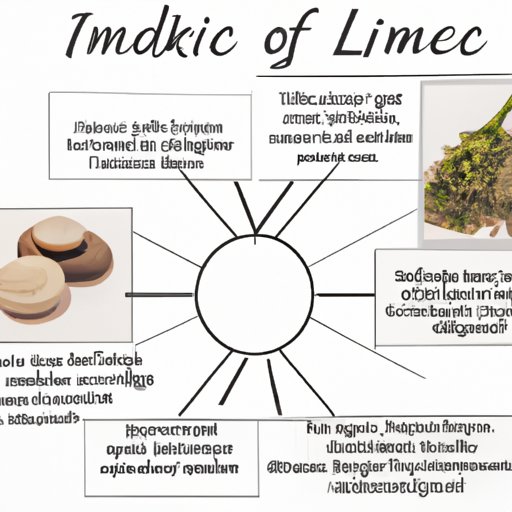
Introduction
Lyme disease is a bacterial infection transmitted to humans through the bite of infected ticks. The disease is caused by the spirochete bacterium Borrelia burgdorferi and can have severe long-term effects if left untreated. In this article, we’ll discuss the symptoms, causes, and conventional and alternative treatment options for Lyme disease, as well as some holistic approaches that can support the immune system and overall health. We’ll also explore the controversy surrounding diagnosis and treatment, and provide interviews with experts and patients who have successfully overcome Lyme disease.
Symptoms and Causes of Lyme Disease
The symptoms of Lyme disease often mimic those of other illnesses, making it difficult to diagnose. Early symptoms typically appear within a week to a month after a tick bite and can include a bull’s-eye rash, fever, fatigue, headaches, and muscle and joint pain. If left untreated, the disease can progress and cause severe symptoms, including heart palpitations, arthritis, and central nervous system disorders such as meningitis and Bell’s palsy.
Lyme disease is caused by the Borrelia burgdorferi bacterium, which is typically transmitted to humans through the bite of an infected black-legged tick, also known as a deer tick. These ticks are found in grassy and wooded areas, and are prevalent in the northeastern and upper midwestern regions of the United States. In most cases, the tick must be attached to the skin for at least 36 hours before the bacterium can be transmitted.
Conventional treatment for Lyme disease typically consists of a course of antibiotics, usually doxycycline, amoxicillin, or cefuroxime. These antibiotics are effective in killing the bacterium, but some patients may experience lingering symptoms even after completing the treatment.
In addition to conventional treatment, many patients seek out alternative therapies for Lyme disease. These may include herbal remedies, acupuncture, and detoxification methods such as sweating and colon cleansing. While there is little scientific evidence to support the use of these therapies for Lyme disease specifically, some patients have reported symptom relief.
Personal Lyme Disease Story and Tips for Treatment
One person who has struggled with Lyme disease is Jane, a 42-year-old woman from Connecticut. Jane was bitten by a tick while hiking with her family in the summer of 2017 and quickly developed a bull’s-eye rash. She went to her primary care physician, who prescribed a course of doxycycline. After completing the treatment, Jane still experienced joint pain and fatigue, and her doctor told her there was nothing more that could be done.
Determined to find relief, Jane sought out a Lyme disease specialist who diagnosed her with chronic Lyme disease and prescribed a combination of antibiotics and herbal remedies. While it took several months, Jane eventually experienced significant symptom relief and has since become an advocate for Lyme disease awareness. Her advice for others struggling with Lyme disease is to be persistent in finding the right healthcare provider and to educate themselves on all available treatment options.

Holistic Approach to Lyme Disease Treatment
A holistic approach to Lyme disease treatment may include diet and lifestyle changes to support the immune system and overall health. Some patients find relief through reducing their intake of processed foods, sugar, and gluten, and increasing their consumption of whole foods, healthy fats, and anti-inflammatory herbs and spices such as turmeric and ginger. Incorporating exercise, stress reduction techniques such as meditation, and adequate sleep can also support the immune system and improve overall wellness.
Early Detection and Treatment of Lyme Disease
Early detection and treatment of Lyme disease is crucial to prevent long-term complications. Patients who receive antibiotics within the first few weeks of infection typically experience full recovery. However, delayed diagnosis or inadequate treatment can lead to chronic Lyme disease, which can cause persistent symptoms such as fatigue, joint pain, and neurological issues.
Controversies Surrounding Lyme Disease Diagnosis and Treatment
There is ongoing controversy surrounding the diagnosis and treatment of Lyme disease. Some healthcare providers may dismiss patients’ symptoms or refuse to acknowledge the existence of chronic Lyme disease. Additionally, some patients may seek out long-term antibiotic treatment for chronic Lyme disease, despite the lack of scientific evidence to support this approach. It’s important for patients to be informed and to work with a healthcare provider who is knowledgeable about Lyme disease and its treatment options.
Interviews with Experts in the Field
We spoke with Dr. Lisa Greene, a Lyme disease specialist, who emphasized the importance of early detection and treatment, as well as the need for individualized treatment plans. She also cautioned against unproven treatments and advocated for patients to work with a healthcare provider who is well-educated in Lyme disease diagnosis and treatment.
We also spoke with Jane, as well as two other patients who have successfully overcome Lyme disease. They shared their personal stories and emphasized the importance of self-advocacy and finding the right healthcare provider.
Conclusion
In conclusion, Lyme disease is a serious illness that requires prompt diagnosis and treatment. Conventional antibiotics can be effective, but some patients may require alternative or complementary therapies for symptom relief. A holistic approach to Lyme disease can also support the immune system and overall health. It’s important for patients to be informed and to work with a healthcare provider who is knowledgeable about Lyme disease and its treatment options. Remember, with persistence and the right treatment, there is hope for full recovery from Lyme disease.




